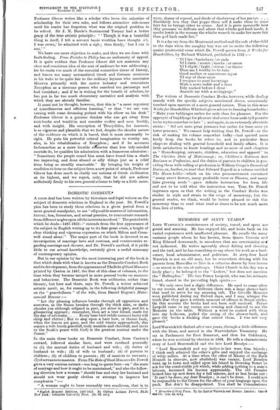DOMESTIC CONDUCT.*
A o0On deal lies been written by historians and legal writers on the subject of domestic: relations in England in the past. Dr. Powell's plan has been to study those relations in a given period front a more general standpoint, to use " all possible sources of information, history, law, literature, and actual practice, to concentrate research from different angles upon all the interests involved." The period with which he deals-1487-1653—" extends from the first appearance of the subject in English writing up to its first great crisis, a height of clear thinking and vigorous expression on which Milton and Crom- well stand alone." The major part of the book is devoted to an investigation of marriage laws and customs, and controversies re- garding marriage and diverse, and Dr. Powell's method, if it yields little to our actual knowledge, certainly gives a useful summary of contemporary opinion.
But in our opinion by far the most interesting part of the hook is that which deals with what is known as the Domestic Conduct Book and its development, from the appearance of TheBokeof Good Manners pr:nted by Caxton in 1487, the first of this class of volumes, to the time when they became merged in more general books on manners and behaviour. The Domestic Book was utilitarian rather than literary, but here and there, says Dr. Powell, a writer achieved artistic merit, as, for example, in the following delightful passage on the " gracefulness " of the wife, from Daniel Rogers's Matti. mania Honour: " Let thy pleasing influence breaks through all opposition and sorrowes, as the &mite breakee through the thick mart, or darke cloudee yea although eclipsed in part, yet shine in part, and let a glimmering appears ; remember, thou art a true friend, made for the day of adversity, . . . Every base bird (while summer lasts) will chirp and chitter ; But to sing upon a bare bow, or thorne bush, when the leaves are gone, and the cold winter approaeheth, this argues a wife trucly graceful, truly amiable and cheerful, and (next to the Soule's peace with God) is the greatest content under the Surma,' In the main these books on Domestic Conduct, from Caxton's onward, followed similar lines, and were confined generally to (1) the mutual duties of husband and wife ; (2) duties of husband to wife ; (3) of wife to husband ; (4) of parents to children ; (5) of children to parents; (6) of masters to servants ; (7) of servants to mestere. From The Boke of Good Manners Dr. Powell gives a very curious extract—too long to quote here—on " the state of maryage and how it ought to be maintained," and also the follow- ing direction how a woman " should fear and obey her husband and should not wear gaudy clothes or attempt to improve her complexion " :- " A woman ought to Issue resonably two condicons, that is to
• Domestic Relations, 1487-1653. By Chilton Latham Powell, Ph.D. Pew leek : Colombia rnhereity Brent 16e: 5d. net.] wyte, shame of repreef, and drede of tlisobeyeng of her party's. . . . Semblably ben they that poppo them self & make then, to seine fayr for to brynge other to synne. And it is grate merueylle how they presume to deffeate and alters that which° god bath made, & mocha bawd° is the woman the whiche weneth to make her more fair than gad had; made her."
It is a far cry from the Montessori method and the cult of the child to the days when the naughty boy was net to recite the following quaint penitential verse which Dr. Powell quotes from A Ircrke for Housholders, by Richard Whitford, published in 1531 :—
" Yf I lye / backebyte / or stele
Yf I curse / °come / mocke / or swore Yf I ehyde / fyght / stryuo / or throb
Then am I worthy to be bete Good mother or maystresso myna Yf any of these nyne I trespaco to your knowyngo With a news rodde and a fyno Erly necked before I dyne Amende me with a aceurgynge."
The writers of Domestic Conduct Books, however, while dealing mainly with the specific subjects mentioned above, occasionally touched upon matters of a more general nature. Thus in this same TI'erke for Housholders Whitford gives advice to farming lanutelielde " Make your byklynges rather for node than for pleasure. For the appetyte of buyldynge for pleasure shat ncuer hone nede tyll pouerte tech° wytte aomwhat to late " ; and again, in en extremely altrtlistio strain : " Sri not unto great peritonea but rather for lease unto ye lower persons." We cannot help wishing that Dr. Powell—at the risk of making his volume somewhat bulky—had quoted more freely from the books he refers to, and in particular from chapters dealing with general household and family affairs. It is little satisfaction to know headings and no more of such chapters as " Housekeeping, servants, children, education and apparel " in The Christen State of Matrimonye ; or, Children's Entrance into Business or Profession, and the duties of parents to children in pro- viding them with calling or profession in William Gouge's Doniestical Duties, or, further, to road that Edward Topsoil in a volume entitled The House-holder—which on his own pronouncement contained " many sweet flowers, many profitable trees or Plantes, and many fairs growing seeds "—gave definite instruction for farm life and not to be told what the instruction was. True, Dr. Powell impresses upon us that tho writing in the Conduct Books was similar in style and strain to the verge of monotony, but the general reader, we think, would ho better pleased to rick this monotony than to read what tend at times to be not much more than lists of titles.














































 Previous page
Previous page